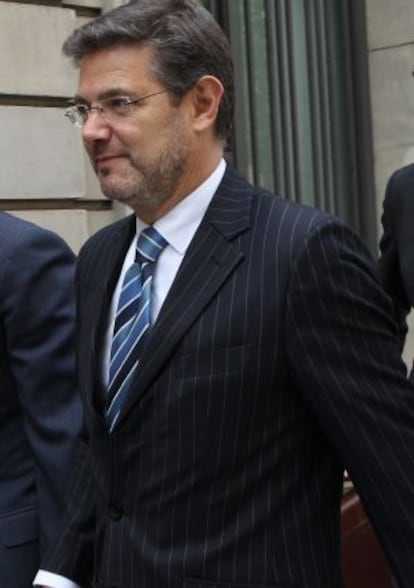Minister forced into U-turn on plan to fine media for reporting judicial leaks
Justice chief Rafael Catalá made comments about placing limits on reporting But his plans have drawn ire even from within his own party


Spanish Justice Minister Rafael Catalá on Thursday was forced to do a U-turn after suggesting that the government has plans on the table to start punishing the media for reporting leaked information from ongoing judicial investigations
On Wednesday, Catalá had told reporters at a conference in Barcelona that he favored “opening a public debate” on whether lawmakers should place limits on how journalists should report on corruption investigations and cases that are still under seal by judges.
Under Spanish law, public servants can be sanctioned for passing on government data and other official information. Catalá’s comments raised the possibility of extending the current law to cover media outlets and their reporters.
“It wouldn’t be such a bad thing to initiate a debate about this if we really think that it is better not to violate the innocent-before-guilty principle,” Catalá said.
But his comments drew ire even from within his own party, with the Popular Party’s secretary of state for congressional relations, José Luis Ayllón, at pains to point out that Catalá’s comments were nothing more than a “personal reflection.” Meanwhile, the PP spokesperson in Congress, Carlos Floriano, insisted that the freedom of the press in Spain is “sacred” and that this view is the “conviction of all of the people who are in the PP, or who, in the case of the minister, are in the government.”
What type of investigative journalism can you do if they intend to clip your wings?”
However, the minister added that the government had no draft bill on the table to start doing so – something he repeated to reporters in Madrid on Thursday morning following criticism from media representatives.
“This isn’t the first time that this use has been brought to the table, and from a journalist standpoint, it must be rejected,” said Spanish Press Federation (FAPE) president Elsa González during an interview with state broadcaster TVE. “What type of investigative journalism can you do if they intend to clip your wings?
The media have long come under fire for reporting investigative details on high-profile corruption cases – many involving ruling Popular Party (PP) officials – over the years.
Catalá noted on Thursday that his only intention had been to open a debate on the issue and that when he talked about responsibility in the leaking of judicial documents under seal he was referring to a discussion now taking place in the European Parliament, where they are debating a directive on the “presumption of innocence.”
“That is the debate I was referring to, to the need to guarantee the presumption of innocence, to the right to a fair trial as in other countries and that is the consideration. I made no proposal to introduce sanctions nor anything that seemed like it,” he said.
Tu suscripción se está usando en otro dispositivo
¿Quieres añadir otro usuario a tu suscripción?
Si continúas leyendo en este dispositivo, no se podrá leer en el otro.
FlechaTu suscripción se está usando en otro dispositivo y solo puedes acceder a EL PAÍS desde un dispositivo a la vez.
Si quieres compartir tu cuenta, cambia tu suscripción a la modalidad Premium, así podrás añadir otro usuario. Cada uno accederá con su propia cuenta de email, lo que os permitirá personalizar vuestra experiencia en EL PAÍS.
¿Tienes una suscripción de empresa? Accede aquí para contratar más cuentas.
En el caso de no saber quién está usando tu cuenta, te recomendamos cambiar tu contraseña aquí.
Si decides continuar compartiendo tu cuenta, este mensaje se mostrará en tu dispositivo y en el de la otra persona que está usando tu cuenta de forma indefinida, afectando a tu experiencia de lectura. Puedes consultar aquí los términos y condiciones de la suscripción digital.








































